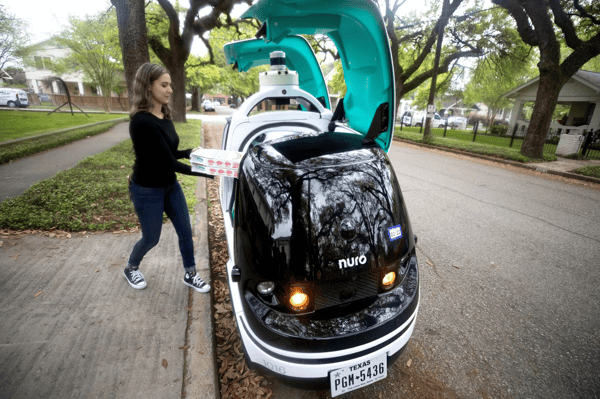

Nuro’s self-driving robot will deliver Domino’s pizza to customers in Houston
Domino’s Pizza has recently announced a groundbreaking pilot program and will be delivering pizzas to homes in Houston using driverless cars. Residents of the Woodlands Heights area will be able to opt-in to receive their pizza delivery via the Nuro R2 robot, the latest in autonomous vehicles. Customers will be able to place an order online, receive updates about R2’s location, and upon its arrival, they’ll receive a unique pin to open R2’s doors and get their pizzas.
In February of 2021, Nuro’s R2 was the first driverless vehicle to receive regulatory approval by the United States Department of Transportation, forever changing the landscape of our roadways. In Houston alone, Nuro’s autonomous vehicles are already being used to deliver groceries and pharmaceuticals. While driverless cars are still more of a gimmick than a serious method of travel, we are quickly approaching a new era of transportation.
Driverless cars and society’s dilemma
The arrival of the driverless car has significant consequences with regards to both our legal and ethical systems. As humans, we can take many factors into account in a heartbeat when we are driving. It is not clear that a driverless car will consider all the different factors that we value as individuals and make the “right decision.”
As an example, imagine a driverless car heading down a two-lane road when a child jumps out into the street chasing a ball. The vehicle should stop, right? But if the driverless car stops and a school bus is behind it, there may be many more children injured when the bus crashes into the driverless car. Maybe the car should swerve into oncoming traffic, but if it does, it will intentionally crash headfirst into other innocent victims. What should it do?
Who’s responsible for self-driving car accidents?
Currently, it is a no-brainer that a negligent driver is responsible for their actions and will be liable for whatever damages result. However, as driverless cars become more and more prevalent, the individual driving will not always be the one responsible. Instead, it could be the auto manufacturer or the tech company that designed the system which steers the car.
As it stands, there are several potential people and/or companies that could end up being held liable in a driverless-car accident, including:
- The person operating the vehicle in or out of autonomous mode;
- The owner of the car;
- The manufacturer of the car or its self-driving parts;
- Programmers and designers;
- Or maintenance crews and others.
Of course, many questions remain about how varying state laws will apply to self-driving cars as they become commonplace. Currently, establishing fault for an accident can be very different depending on where the accident happens. “No-fault” laws and other differences by varying states could make proving an injury case involving a self-driving car all the more difficult. As the landscape of transportation evolves, so must our awareness and understanding of the laws that govern them.
Click here to learn what to do you or someone you know has been injured by a self-driving car.

